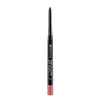What's inside
What's inside
 Key Ingredients
Key Ingredients

 Benefits
Benefits

No benefits
 Concerns
Concerns

 Ingredients Side-by-side
Ingredients Side-by-side

Methyl Trimethicone
Skin ConditioningOryza Sativa Bran Wax
Skin ConditioningTrimethylsiloxysilicate
EmollientOctyldodecanol
EmollientSynthetic Fluorphlogopite
Acrylates/Dimethicone Copolymer
Skin ConditioningPersea Gratissima Oil
Skin ConditioningTocopheryl Acetate
AntioxidantDisteardimonium Hectorite
StabilisingMethyl Di-T-Butyl Hydroxyhydrocinnamate
AntioxidantPropylene Carbonate
SolventParfum
MaskingCI 77491
Cosmetic ColorantCI 77492
Cosmetic ColorantCI 77499
Cosmetic ColorantCI 77891
Cosmetic ColorantMethyl Trimethicone, Oryza Sativa Bran Wax, Trimethylsiloxysilicate, Octyldodecanol, Synthetic Fluorphlogopite, Acrylates/Dimethicone Copolymer, Persea Gratissima Oil, Tocopheryl Acetate, Disteardimonium Hectorite, Methyl Di-T-Butyl Hydroxyhydrocinnamate, Propylene Carbonate, Parfum, CI 77491, CI 77492, CI 77499, CI 77891
Methyl Trimethicone
Skin ConditioningPolyethylene
AbrasiveTrimethylsiloxysilicate
EmollientSynthetic Fluorphlogopite
Octyldodecanol
EmollientParaffin
PerfumingAcrylates/Dimethicone Copolymer
Skin ConditioningCera Microcristallina
Emulsion StabilisingMagnesium Silicate
AbsorbentDisteardimonium Hectorite
StabilisingAluminum Hydroxide
EmollientCI 77120
Cosmetic ColorantPropylene Carbonate
SolventNylon-12
Pentaerythrityl Tetra-Di-T-Butyl Hydroxyhydrocinnamate
AntioxidantAlumina
AbrasivePolyisobutene
Tin Oxide
AbrasiveCalcium Sodium Borosilicate
Mica
Cosmetic ColorantCI 77891
Cosmetic ColorantCI 77491
Cosmetic ColorantCI 77492
Cosmetic ColorantCI 77499
Cosmetic ColorantCI 45410
Cosmetic ColorantCI 15850
Cosmetic ColorantCI 77742
Cosmetic ColorantCI 42090
Cosmetic ColorantCI 75470
Cosmetic ColorantCI 19140
Cosmetic ColorantMethyl Trimethicone, Polyethylene, Trimethylsiloxysilicate, Synthetic Fluorphlogopite, Octyldodecanol, Paraffin, Acrylates/Dimethicone Copolymer, Cera Microcristallina, Magnesium Silicate, Disteardimonium Hectorite, Aluminum Hydroxide, CI 77120, Propylene Carbonate, Nylon-12, Pentaerythrityl Tetra-Di-T-Butyl Hydroxyhydrocinnamate, Alumina, Polyisobutene, Tin Oxide, Calcium Sodium Borosilicate, Mica, CI 77891, CI 77491, CI 77492, CI 77499, CI 45410, CI 15850, CI 77742, CI 42090, CI 75470, CI 19140
Ingredients Explained
These ingredients are found in both products.
Ingredients higher up in an ingredient list are typically present in a larger amount.
This polymer has film-forming properties and helps leave behind a soft film on the skin with oxygen permeability.
That's why you'll most likely find this in sunscreen formulations.
Ci 77491 is also hydrated iron III oxide. It's sole purpose is to give a red/pink hue to products.
Iron III oxides are classified as inorganic chemicals for coloring.
Synthetically created Ci 77491 is considered safer than those naturally found. This is because the synthetically created version may contain less impurities. Iron oxides are generally non-toxic and non-allergenic.
Learn more about CI 77491Ci 77492 is also hydrated iron III oxide. It's sole purpose is to give a yellow hue to products.
Iron III oxides are classified as inorganic chemicals for coloring.
Synthetically created Ci 77492 is considered safer than those naturally found. This is because the synthetically created version may contain less impurities. Iron oxides are generally non-toxic and non-allergenic.
Learn more about CI 77492Ci 77499 is also hydrated iron III oxide. It is created from mixing red and black iron oxides. This helps give shades of darkness to a product.
Iron III oxides are classified as inorganic chemicals for coloring.
Ci 77891 is a white pigment from Titanium dioxide. It is naturally found in minerals such as rutile and ilmenite.
It's main function is to add a white color to cosmetics. It can also be mixed with other colors to create different shades.
Ci 77891 is commonly found in sunscreens due to its ability to block UV rays.
Learn more about CI 77891Disteardimonium Hectorite comes from the clay mineral named hectorite. It is used to add thickness to a product.
It can also help stabilize a product by helping to disperse other ingredients.
Hectorite is a rare, white clay mineral.
Learn more about Disteardimonium HectoriteMethyl Trimethicone is a type of silicone. It is a solvent and emulsifier.
Solvents are used to keep ingredients together in a product. They can help dissolve ingredients to stable bases or help evenly distribute ingredients throughout the product.
Emulsifiers help stabilize a product. It does this by preventing certain ingredients from separating.
Methyl Trimethicone does not get absorbed into the skin.
Learn more about Methyl TrimethiconeOctyldodecanol is a fatty alcohol. It is primarily used to enhance the texture of products.
As an emulsifier, Octyldodecanol helps prevent the oils and waters from separating. It also prevents ingredients from creating foam when shaken.
Octyldodecanol is created by reducing fatty acid to an alcohol.
Due to its high molecular weight, it does not get absorbed into the skin.
Learn more about OctyldodecanolThis ingredient is a solvent. It helps dissolve active ingredients and alter the texture of products.
Propylene Carbonate is commonly used in makeup and with clay, such as montmorillonite or bentonite.
Studies show this ingredient to be safe for cosmetics. When it is undiluted, it can cause skin irritation. (It is always diluted in skincare and makeup). This ingredient is water-soluble.
Propylene Carbonate is created from propylene glycol and carbonic acid.
Learn more about Propylene CarbonateSynthetic Fluorphlogopite is the synthethic version of mica. It consists of fluorine, aluminum and silicate.
Synthetic Fluorphlogopite is used to add volume to products.
It is considered non-irritating on the skin.
Learn more about Synthetic FluorphlogopiteThis silicone is an emollient. Emollients create a thin film on the skin to prevent moisture from escaping.
It is not soluble in water and helps increase water-resistance in products.
According to a manufacturer, it can blend seamlessly with silicone oils, such as Cyclopentasiloxane.
Learn more about Trimethylsiloxysilicate